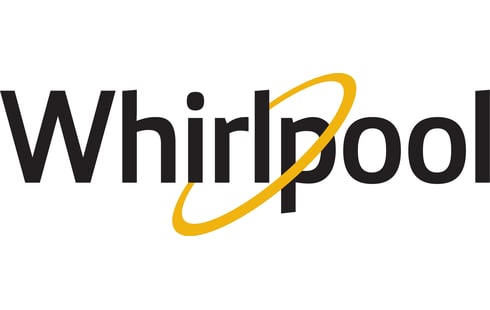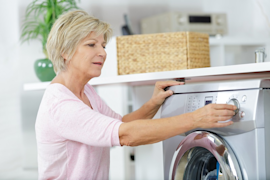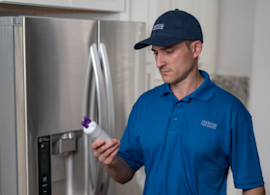Whirlpool compact front-load washer error codes

These error code explanations can help you diagnose a problem with your Whirlpool compact front-load washer. For DIY repair how-to help, visit the PartsDirect repair help section, which includes repair help for washing machines, other major appliances, lawn and garden equipment, garage door openers, vacuum cleaners and more. Search for your model number to find a complete list of replacement parts for your washer.
No water detected
Make sure both water supply valves behind the washer are fully open. In winter, check the fill lines for freezing. Check the drain system for a siphon problem. If the water valve assembly is defective, replace it.
Long drain
Remove excess suds; the washer can't drain excessively sudsy water. Check your house drain system for a clog. Check the drain hose for kinks or clogs. Replace the drain pump if defective. If the washer drains properly, replace the water level pressure switch because it isn't accurately detecting the water level.
Overflow condition
Unplug the washer and, if the washer is overfilled, check the water valve assembly for proper water shut-off. If the water valve assembly is defective, replace it. If the washer is empty when this error code appears, replace the water level pressure switch.
Temperature sensor failure
Unplug the washer and check the wire harness between the water temperature sensor and the main electronic control board. Reconnect any loose wires or replace the wire harness if damaged. If the wiring is okay, replace the temperature sensor.
Motor tachometer failure
Unplug the washer and check the wire harness connections between the motor control board and the drive motor. Check the wire harness connections between the motor control board and the main electronic control board. Reconnect any loose wires or replace any damaged wire harnesses. If the wiring connections are okay, check to see if the spin basket rotates smoothly. If not, remove any obstruction between the spin basket and tub. If the spin basket rotates smoothly, replace the drive motor. If the problem continues, replace the motor control board.
Motor can't reach correct speed
Unplug the washer and check the wire harness connections between the motor control board and the drive motor. Check the wire harness connections between the motor control board and the main electronic control board. Reconnect any loose wires or replace any damaged wire harnesses. If the wiring connections are okay, replace the drive motor. If the problem continues, replace the motor control board.
Door lock failure
Unplug the washer and clear any debris out of the catch on the door lock assembly. Replace the door lock assembly if damaged. If the assembly isn't damaged, check the wire harness connections between the door lock assembly and the main electronic control board. Reconnect any loose wires or replace the wire harness if damaged.
Main electronic control board EEPROM error
The Electrically Erasable Programmable Read-Only Memory (EEPROM) on the main electronic control board is corrupted. Unplug the washer for 5 minutes, restore power and see if the code clears. If not, the replace the main electronic control board.
Communication error between the main electronic control board and the motor control board
Unplug the washer and check the wire harness connections on the main electronic control board, motor control board and drive motor. Reconnect any loose wires and replace any damaged wire harnesses. If there are no wire connection problems, replace the motor control board. If the problem continues, replace the main electronic control board.
Load detected during the washer cleaning cycle
Remove clothes from the washer. The washer must be empty when running a washer cleaning cycle.
Water level pressure switch failure
Unplug the washer. Check the wire harness between the water level pressure switch and the main control board. Reconnect any loose wires or replace the wire harness if damaged. If the wiring is okay, replace the water level pressure switch.
Overflow condition
Unplug the washer and, if the washer is overfilled, check the water valve assembly for proper water shut-off. If the water inlet valve assembly allows water flow with the washer unplugged, replace the water inlet valve assembly because it's defective. If the washer is empty when this error code appears, replace the water level pressure switch.
Drain pump drive system error
Unplug the washer. Check the wire harness connections between the drain pump and the main electronic control board. Reconnect any loose wires or replace the wire harness if damaged. If the wiring is okay, replace the main electronic control board because it detects an internal error in the electronic circuit that controls the drain pump.
Motor control board error
Unplug the washer. Check the wire harness connections on the motor control board, drive motor and main electronic control board. Reconnect any loose wires or replace any damaged wire harnesses. Replace the motor control board if you don't find any wiring problems.
Door switch failure
This code appears if the main electronic control board does not detect the door opening after 3 consecutive loads, indicating that the door switch may have failed. If you've started a cycle several times without opening the door, open the door to clear this code. The code also displays when the door switch is open with the door locked. Unplug the washer and check the wire harness connections between the door switch and the main electronic control board. Reconnect any loose wires or replace the wire harness if damaged. If the wiring connections are okay, replace the door switch.
Door lock or door switch failure
The control detects that the door switch is open with the door locked. Push the door in and check to make sure it's completely closed. If the door is closing completely and the error occurs, replace the door switch. If the problem continues, replace the door lock assembly.
Excessive suds
If you see excessive suds in the washer, you're likely using too much high-efficiency (HE) detergent. Remove the wet clothes from the washer and add 1 tablespoon of vegetable oil to the tub to dissipate the excessive suds. Restart the washer on a normal cycle without adding any additional detergent. After the cycle ends, run the clean washer cycle with bleach added to rinse out suds residue from the washer tub. Reduce the amount of high-efficiency (HE) detergent that you use to avoid excessive suds.
Most common symptoms to help you fix your washers
Choose a symptom to see related washer repairs.
Main causes: broken lid switch or lid lock, bad pressure switch, broken shifter assembly, faulty control system…
Main causes: lack of electrical power, wiring failure, bad power cord, electronic control board failure, bad user interf…
Main causes: leaky water inlet valve, faulty water-level pressure switch, bad electronic control board…
Main causes: water heater failure, bad water temperature switch, faulty control board, bad water valve, faulty water tem…
Main causes: no water supply, bad water valves, water-level pressure switch failure, control system failure, bad door lo…
Main causes: worn agitator dogs, bad clutch, broken motor coupler, shifter assembly failure, broken door lock, suspensio…
Main causes: unbalanced load, loose spanner nut, worn drive block, broken shock absorber or suspension spring, debris in…
Main causes: clogged drain hose, house drain clogged, bad drain pump, water-level pressure switch failure, bad control b…
Main causes: bad lid switch or door lock, bad timer or electronic control board, wiring failure, bad water inlet valve a…
Most common repair guides to help fix your washers
Effective articles & videos to help repair your washers
Use the advice and tips in these articles and videos to get the most out of your washer.

Find tips for using your washing machine efficiently to save energy and help reduce utility bills.…

Learn about all the convenient features on our Sears PartsDirect website that make your parts purchases easier.…

Get answers to frequently asked questions about Sears and Sears PartsDirect.…